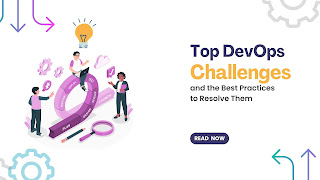DevOps solution is basically a paradigm shift just like the way, your software development is accomplished. The crux of DevOps solutions is defining cultural feedback, employee collaboration, and hence continuous improvement.
Being a continuous process targeting software delivery improvement, the solution helps in business growth. Through the implementation of this methodology, companies can further improve the development process making it reliable, and efficient.
The said solution is widely used across industries like retail, finance, government, healthcare, and different advanced technology. Now there are a lot of challenges that might occur while implementing this solution.
This piece of article will shed light on many challenges in DevOps and the best practices that companies implement to resolve them.
Top 4 Challenges in DevOps Solutions in any Organization
The next part will reveal the top four DevOps solution challenges that companies face during the implementation process.
1. Alteration in the Working culture
Whenever the implementation process is on, DevOps solution undergoes an immense change in the workplace. As it takes a long time the implementing the DevOps solution, the overall transformation process is lengthy and difficult, the professionals need to be patient while incorporating the solution.
This is why, companies need to embrace a positive work atmosphere when they decide to incorporate DevOps solutions.
2. Quick Shift to Microservices in Place of Legacy Infrastructure
Companies always need to make use of their existing infrastructure with code installed with the microservices. They tend to do it to eliminate stability issues. Microservices are focused on achieving quicker development by matching the steps with the invention of the latest technologies.
With the regular updates of software and hardware systems Organizations need to upscale their internal process along with the trending technologies to survive in the existing system.
3. Some Critical Issues with Metrics
Development and operations have a versatile working nature with a wide variety of business goals. To achieve that goal they need to incorporate different kinds of toolsets.
When a different metrics system is implied in this, business operations might get affected and companies fail to achieve that goal.
This is the reason that businesses should maintain one common metrics system to decide and come to one solution commonly.
4. DevOps Tool Turbulence
People may become reliant on the different tools at their disposal to address even the most minor of their problems if they switch to DevOps practices.
As a result, businesses may develop a dependence on short-term benefit-focused instruments at the expense of long-term benefit-focused ones.
Some of the tools can be easily used without any permission because they are open-sourced or SaaS-based. You may make things simpler by offering teams a selection of library tools from which to select their favorite tools. The leaders will be able to keep up with the employees' actions thanks to this as well.
Some Smart Approaches to Resolve Issues Appear with DevOps
Companies Most of the Time Face Immense Challenges while they tend to implement DevOps methodologies. This can affect their business goal set. The issues can be seen in organizations due to many reasons.
These reasons include a lack of clear conception of business objectives, a clear shot of cultural resistance, infrastructure, and toolset constraints, a required skill gap, and many other challenges to point out.
But if an organization looks for the proper target-based approach then they must look for smart solutions to overcome these challenges. Let’s understand what are the parameters to overcome those challenging areas of the DevOps solution.
1. Steady Delivery Process and Integration
These are the best resolve area that a company can implement in its system. The continuous integration and delivery system allow immediate merging of many code changes with the already set repository.
This resolve area also ensures that the change in code is tested before the implementation. As this is a rapid and automatic system for any DevOps implementation challenges, it helps you save a lot of time for future projects.
2. Infrastructure as Code
Another practice-based resolve area is Infrastructure as code. It incorporates declarative infrastructure management through the use of code. Automating the provisioning and configuration of their infrastructure, this method enables organizations to manage their infrastructure in the same way that they manage their applications.
This method decreases the possibility of human setup errors, speeds up infrastructure provisioning, and makes environment replication simple.
3. Continuous Monitoring
Continuous monitoring is another solution-based approach to the DevOps challenges used by companies across industries. This is the approach that involves a steady analysis and collection from system data input which help you to reach to the insights from behavior and performance of those internal systems of DevOps operations.
This will help the organizations check how applications perform and point out the issues of DevOps operation before they occur.
Concluding Thoughts
DevOps problems can be a pain in a business that otherwise operates well. But there are also ways to deal with these problems by putting the proper ideas into practice. Just contact OrangeMantra if you need help with the process.
This is due to the fact that an IT organization has fewer incentives for inappropriate behavior than any other area of the company. DevOps development company in India focuses on resolving those issues that arise in the solution and helping the organizations grow impeccably.



